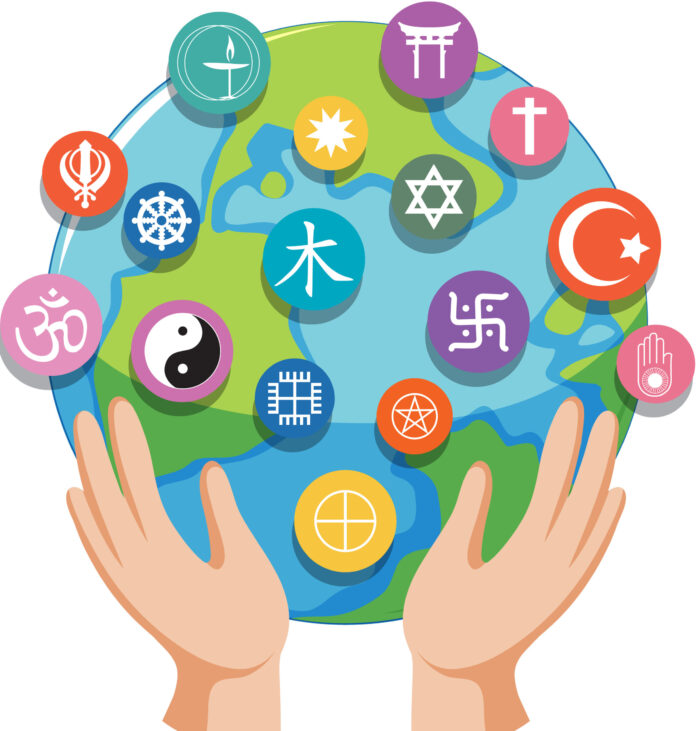India, a land of immense diversity, is a spiritual hub where multiple religions and cultures thrive together. The relationship between Indian mythology and God is deeply rooted in the country’s religious traditions, shaping beliefs and practices across generations. From the many deities of Hinduism to the strict monotheism of Islam, and the non-theistic philosophies of Buddhism and Jainism, each faith offers a unique perspective on divinity. In this article, we explore how five major religions interpret Indian mythology and God, highlighting the profound spiritual connections that define India’s rich cultural landscape.
Hinduism: Understanding Brahman, Divine Deities, and the Law of Karma
Hinduism is one of the oldest religions in the world, and its understanding of God is highly complex and dynamic. Central to Hinduism is the belief in Brahman, the supreme, unchanging reality beyond the material world. Brahman is immanent (present in the universe) and transcendent (beyond the universe). However, Hinduism’s polytheistic nature allows for multiple manifestations of the divine, representing various aspects of Brahman.
Hinduism’s pantheon includes gods and goddesses such as Vishnu (the preserver), Shiva (the destroyer), and Durga (the mother goddess). These deities are not separate gods but different forms of the same divine presence. Festivals like Diwali (celebrating Lord Rama’s return) and Navratri (honoring Durga) showcase how deeply these deities are woven into the fabric of Indian culture.
Unlike Hinduism, Buddhism offers a non-theistic perspective on spirituality. Founded by Gautama Buddha in the 6th century BCE, Buddhism does not emphasize the worship of a creator God. Instead, it focuses on attaining enlightenment—a state of perfect wisdom and freedom from suffering. Nirvana, the ultimate goal in Buddhism, represents the liberation from the cycle of samsara.
Buddhists believe that through meditation, ethical conduct, and mental discipline, one can achieve enlightenment. While devas (celestial beings) exist in Buddhist cosmology, they are not immortal or omnipotent. Instead, they are also subject to the cycle of birth, death, and rebirth, just like humans. Devas may be revered but are not worshipped as supreme beings. Buddhism teaches the Four Noble Truths, which address the nature of suffering and how to overcome it through the Eightfold Path. This path leads to spiritual awakening and ultimate liberation. While Buddhism originated in India, its influence has spread globally, shaping cultures from Tibet to Japan.
Islam: Monotheism, Allah, and the Quran
Islam, which arrived in India in the 7th century, is a strictly monotheistic religion. Followers of Islam, known as Muslims, believe in one God—Allah—who is eternal, all-knowing, and all-powerful. Allah is seen as the sole creator of the universe, and Islamic belief emphasizes that no other beings or entities share in His divinity.
The concept of God in Islam is deeply intertwined with the Quran, the holy book of Islam, which is considered the literal word of Allah as revealed to the Prophet Muhammad. The Quran provides guidance on all aspects of life, from spiritual matters to daily living, making it the cornerstone of the Islamic faith. Monotheism is strictly observed, and any form of idolatry (known as shirk) is forbidden in Islam.
Muslims in India contribute to the country’s rich cultural fabric through architectural marvels like the Taj Mahal and the vibrant celebration of festivals like Eid al-Fitr and Eid al-Adha. Islamic traditions of community service, charity, and devotion are also integral to its cultural identity.
Jainism: Non-Violence, Souls, and Tirthankaras
Jainism takes a unique approach to divinity, emphasizing the sanctity of every soul. Central to Jain philosophy is the principle of ahimsa (non-violence), which extends to all living beings. Jains believe that every being has a soul, and the goal of life is to liberate the soul from the cycle of reincarnation and achieve a state of perfect bliss or moksha.
Jainism does not believe in a supreme creator God. Instead, it focuses on the individual’s spiritual journey. Mahavira, the 24th and last Tirthankara, is the most well-known figure in Jainism, and his teachings continue to guide Jains toward self-purification and non-violence.
Jain temples, such as those at Mount Abu and Palitana, reflect the peaceful and disciplined lifestyle encouraged by the religion. The community’s commitment to ethical living and non-violence has left a profound mark on Indian society.
Sikhism: Monotheism, Waheguru, and Guru Granth Sahib
Sikhism, founded by Guru Nanak in the 15th century, is a relatively young religion compared to Hinduism and Buddhism. Sikhs believe in one God, known as Waheguru, who is formless, eternal, and beyond human comprehension. Sikhism is rooted in the belief that all humans are equal in the eyes of God, regardless of caste, gender, or creed.
Central to Sikh worship is the Guru Granth Sahib, the holy scripture of Sikhism. This text contains the hymns and teachings of Sikh Gurus, as well as saints from other faiths. The Golden Temple in Amritsar, the holiest shrine for Sikhs, symbolizes the importance of community service, equality, and devotion to God.
Sikhism’s emphasis on sewa (selfless service) and meditation on God’s name (known as Simran) is reflected in the daily lives of Sikhs. The religion rejects idol worship and rituals, instead promoting a personal connection with the divine through good deeds and devotion.
Cultural Influences on the Concept of God in India
India’s diverse cultural landscape has a significant influence on how religious beliefs are practiced. Local customs, regional traditions, and folklore often blend with religious teachings, creating a unique spiritual environment. For example, Hindu deities may be worshipped under different names in various parts of the country, and Sufi traditions within Islam have a distinct presence in Indian culture. Festivals like Diwali, Holi, Eid, and Vaisakhi are celebrated by people across religions, fostering a sense of unity amidst diversity. Even the more philosophical religions like Buddhism and Jainism have left a lasting legacy on Indian art, architecture, and social norms.
Conclusion
India’s spiritual diversity is deeply intertwined with Indian mythology and God, shaping beliefs and practices across various religions. From the polytheistic deities in Hinduism to the non-theistic enlightenment in Buddhism, the monotheistic faith of Islam and Sikhism, and the soul-centered spirituality of Jainism, each tradition offers a unique perspective on the divine. These beliefs go beyond theology, influencing India’s culture, art, architecture, and daily life. Whether through rituals, festivals, or sacred texts, Indian mythology and God continue to inspire and guide millions on their spiritual paths, reflecting the nation’s rich and evolving religious heritage.







